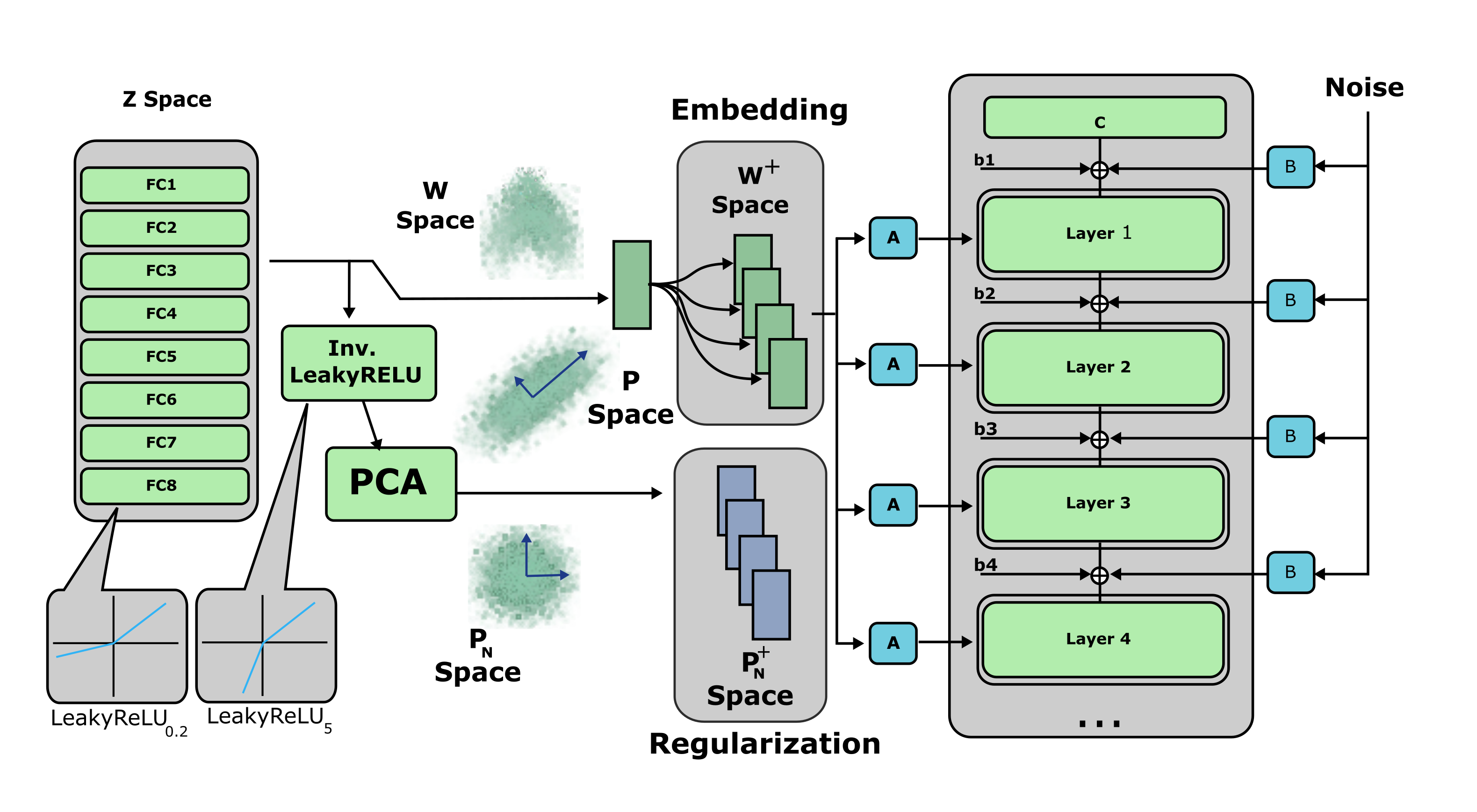Peihao Zhu,
Rameen Abdal,
Yipeng Qin,
John Femiani,
Peter Wonka
Abstract StyleGAN is able to produce photorealistic images that are almost indistinguishable from real photos. The reverse problem of finding an embedding for a given image poses a challenge. Embeddings that reconstruct an image well are not always robust to editing operations. In this paper, we address the problem of finding an embedding that both reconstructs images and also supports image editing tasks. First, we introduce a new normalized space to analyze the diversity and the quality of the reconstructed latent codes. This space can help answer the question of where good latent codes are located in latent space. Second, we propose an improved embedding algorithm using a novel regularization method based on our analysis. Finally, we analyze the quality of different embedding algorithms. We compare our results with the current state-of-the-art methods and achieve a better trade-off between reconstruction quality and editing quality.
Official Implementation of "Improved StyleGAN Embedding: Where are the Good Latents?".
- Linux or macOS
- NVIDIA GPU + CUDA CuDNN
- Python 3
- Clone the repository:
git clone https://github.com/ZPdesu/II2S.git
cd II2S
- Dependencies:
We recommend running this repository using Anaconda.
All dependencies for defining the environment are provided in
environment/environment.yml.
If the automatic download doesn't work, please download the pre-trained models from the following links.
| Path | Description |
|---|---|
| FFHQ StyleGAN | StyleGAN model pretrained on FFHQ with 1024x1024 output resolution. |
| Metfaces StyleGAN | StyleGAN model pretrained on Metfaces with 1024x1024 output resolution. |
| AFHQ-Dog StyleGAN | StyleGAN model pretrained on AFHQ-Dog with 512x512 output resolution. |
| AFHQ-Cat StyleGAN | StyleGAN model pretrained on AFHQ-Cat with 512x512 output resolution. |
| AFHQ-Wild StyleGAN) | StyleGAN model pretrained on AFHQ-Wild with 512x512 output resolution. |
| Face Landmark Model | Face landmark model used in dlib. |
By default, we assume that all models are downloaded and saved to the directory pretrained_models.
To embed images, make sure the hyper-parameters are configured in options/face_embed_options.py.
Then run the code
python main.py --input_dir XXX --output_dir XXX
Please perform the following adjustments in main.py to expand the input types.
- Input folder
ii2s.invert_images(image_path=args.input_dir, output_dir=args.output_dir)
- Image path
ii2s.invert_images(image_path='input/28.jpg', output_dir=args.output_dir)
- Image path list
ii2s.invert_images(image_path=['input/28.jpg', 'input/90.jpg'], output_dir=args.output_dir)
To save output and return latent codes, users can make the follwoing adjustments in main.py.
final_latents = ii2s.invert_images(image_path=args.input_dir, output_dir=args.output_dir, return_latents=True, save_output=True)
By default, the input should be aligned images with 1024x1024 resolution. Users can run align_face.py to align unprocessed images and save them in another folder, then make the following modifications in main.py.
final_latents = ii2s.invert_images(image_path=args.input_dir, output_dir=args.output_dir, return_latents=True, save_output=True, align_input=False)
We also allow the alignment step during the embedding process.
final_latents = ii2s.invert_images(image_path=args.input_dir, output_dir=args.output_dir, return_latents=True, save_output=True, align_input=True)
@misc{zhu2020improved,
title={Improved StyleGAN Embedding: Where are the Good Latents?},
author={Peihao Zhu and Rameen Abdal and Yipeng Qin and John Femiani and Peter Wonka},
year={2020},
eprint={2012.09036},
archivePrefix={arXiv},
primaryClass={cs.CV}
}
